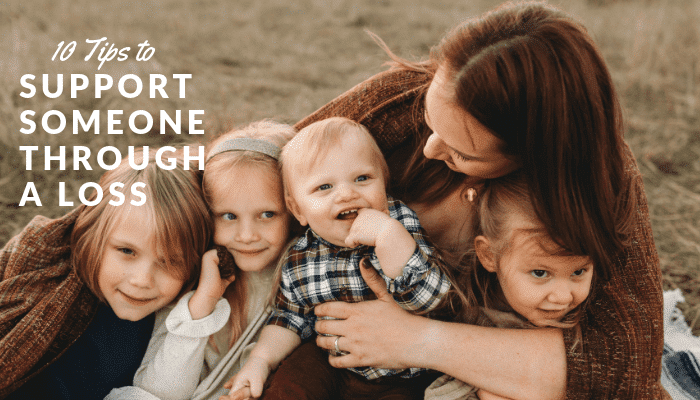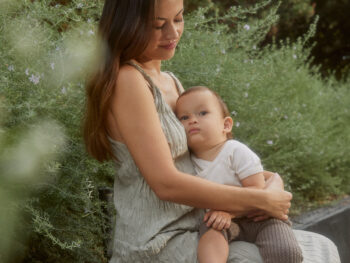
A lot of people don’t know what to say to someone who had a miscarriage or stillbirth.
We want to be helpful and supportive to families during this time of great suffering, but finding the right words can be challenging. Sometimes, we avoid saying anything at all to avoid saying the “wrong” thing.
Nearly one in four pregnancies ends in a loss. Odds are, you know someone, or many people, who have had one.
A few years ago, I supported a woman through a stillbirth at 34 weeks pregnant. It changed me, and it changed how I support women through and after loss of any kind.
Knowing what to say to someone who loses a baby is not complicated, and offering condolences for miscarriage is not only appropriate, but can help lift families during their grief.
Here are some things I learned about how to comfort someone who has had a miscarriage or stillbirth. And keep reading for a list of resources to further assist a family suffering a loss and what to do for a friend who had a miscarriage.
Originally published in 2018, this article was updated and republished on April 5, 2021.
10 Ways to Comfort Someone Who Had a Miscarriage, Stillbirth, or Infant Loss
These suggestions about what to say and how to support someone after a pregnancy or infant loss are great places to start.
Use what you know about your relationship with the person you are supporting to understand which of these will best help them.
Don’t assume you know what it is like or compare their grief
It is best not to assume you know what it is like to experience a miscarriage or stillbirth because your sister/friend/cousin went through a loss.
As a culture, we tend to compare or “one-up” a story when it comes to pregnancy and birth. You don’t have to compare experiences or relate to them to feel empathy and hold space.
Never use the words “at least…”
Look on the bright side, the cup is half full, there is a silver lining on the cloud if you just look for it — these are things a mother working through grief from a miscarriage does not need to hear.
If you catch yourself saying, “At least you know you can get pregnant”, “at least you have three other healthy children”, “at least you can try again”, or “at least” followed by anything, catch yourself.
There is no “at least” right now. There is just suffering and grief. Using phrases like this downplays their experience. Yes, they are likely grateful for all of the things they DO have, but the loss they feel is still so significant and needs to be allowed to take up their whole heart for a time to progress towards healing later.
Please don’t say “at least” ever. I mean it. Just don’t.
Be present
A big part of supporting someone through a loss is just being there. Ask your friend how they feel, then be quiet and listen.
Don’t try to think of how to respond or what to say next. If they like to be hugged, hug them, but don’t force a hug. Be in their space, acknowledge the grief, then simply listen to hear and hold space.
Cry with them, let them cry on your shoulder, and just listen.
Silence is ok and sometimes needed
You don’t have to know exactly what to say to someone who had a miscarriage or loss. When there is only silence, just listen to silence. Don’t try to fill the silence by talking.
This one is hard for me; most of the time, silence makes me feel uncomfortable, and I try to fill it with words, any words.
One thing I have had to work on, and my doula work has helped me with this, is just letting people sit with their grief. I recognize that sometimes, my physical presence is enough, no words necessary.
Practice just being silent; your physical presence is enough and helps in significant ways.
When all else fails, bring food
Food is always a good idea. Bringing a nourishing meal or snack is a great way to show you care, especially if you are in a time crunch or don’t know what to say.
Bring food in disposable containers they don’t have to return, and bring paper plates and plastic-ware so they don’t have to do dishes.
Drop it off on the porch and tell them it is there; this is especially good if your friend suffering a loss isn’t up for visitors.
Find loss support resources in your area
Know the appropriate resources for loss in your area to further support the family. There are support groups, both in-person and on Facebook, and therapists that specialize in prenatal and infant loss.
If you are not aware of available resources, do a quick google search for postpartum doulas in your area. There are types of doulas specially trained in supporting loss, and they will be able to get you connected.
Look for VBAC books or books on pregnancy and labor, which may contain helpful advice on dealing with loss and failure in pregnancy.
Use actions, not “Let me know if you need anything”
Don’t just say, “Let me know if you need anything,” because nobody will ever ask. They do need things, even if they don’t know what that is.
Just do something, like bring food or get them a glass of water or their favorite drink.
Ask them:
- When can I bring you dinner?
- When is a good time for me to have your kids over?
- What time can I come over and fold your laundry, do your dishes, and tidy up?
Just do it.
Check-in after the funeral or service
The day after the funeral, everybody is gone, and it feels like life is trying to get back to normal when it is nothing close to it.
The days and weeks after the funeral, when everyone is back to their everyday lives, are complicated after a miscarriage or stillbirth. The shift from getting cared for all the time to not getting cared for at all is incredibly hard.
A nice gesture or thought, a meal or flowers after everything has “settled,” will remind the grieving person they are not alone.
Use the child’s name
It sounds so simple, but using the child’s name makes a big difference. If they have named the child they lost, use the name. Don’t avoid using it, and if you do not know what name they chose, ask.
Ask parents about the child they lost, ask what they remember about them, and always remember to count them when referring to the number of children they have.
Having someone say their child’s name lets them know that others remember the life they lost.
Remember the milestones
Their child existed in a very real way, and having people forget that is hard. Because we don’t know what to say to when someone loses a baby, people tend to avoid the topic altogether.
A mother suffering a loss wants to feel like her child mattered to the world. She is still going through that child’s birthdays, significant anniversaries, and holidays with that child, just in a different way than if they were living.
Talking about the child eases some of that grief and helps her not to feel so alone.
Lastly, if you feel anyone is in danger or that the mother or any other family member is thinking of harming themselves or others, call for help immediately. Text the word “CONNECT” to the crisis helpline at 741741 for immediate access to resources.
Resources for Supporting and Processing Stillbirth and Infant Loss
Sometimes, knowing you are not alone and connecting with others going through the same struggle helps more than anything else.
Here are some national and online resources we have found helpful for parents.
Center for Loss in Multiple Birth (CLIMB): A resource for supporting women who have lost one or more children in a twins or multiples pregnancy.
When a Grieving Mother Talks, Listen: New York Times article on supporting a grieving mother.
Stillbirthday: This is an organization that connects mothers with bereavement doulas and chaplains.
NILMDTS (Now I Lay Me Down to Sleep): This organization provides birth and newborn photography for families suffering a stillbirth.
Molly Bears: A nonprofit organization that gifts Mothers of loss a bear weighted to their child’s birth weight.
In episode 28 of our podcast, we honor Madelyn and her mother, Megan.
Want to make a difference for VBAC moms? Register today for our Advanced VBAC Doula Certification Course, and start practicing as a certified VBAC doula!













 The Power Behind Skin-to-Skin Contact After C-section: Benefits for Mom and Baby
The Power Behind Skin-to-Skin Contact After C-section: Benefits for Mom and Baby
As a mother of that has gone through a loss it is hard. A lot of people don’t know how to approach you and some are so kind and a simple you are in my thoughts or prayers is a little uplifting to say the least. I had a stillborn at 39 weeks.